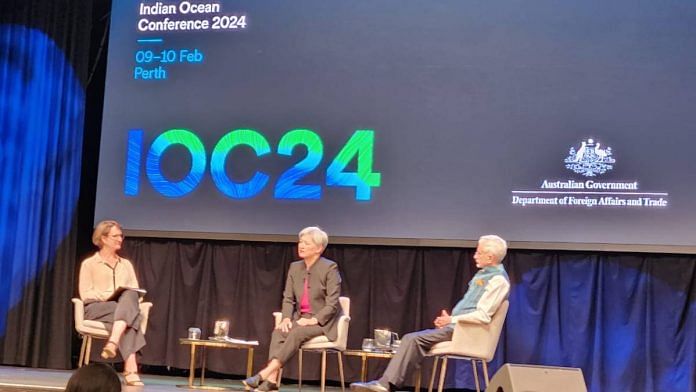Perth: As the new threat in the Red Sea from the Iran-backed Houthi rebels continues to wreak havoc on global maritime trade amid China’s muscle-flexing, the Indian Ocean region countries met in Perth, Australia, and emphasised on the importance of keeping the ocean zone stable and sustainable.
“These two adjectives are laden with much meaning especially at such turbulent times,” said Indian External Affairs Minister S. Jaishankar at the seventh Indian Ocean Conference in Perth, jointly organised by the Ministry of External Affairs, New Delhi-based think tank India Foundation and the Australian government.
But the ocean region isn’t quite ready yet to lead, he added.
“As we gaze at the Indian Ocean, the challenges besetting the world are in full display. At one extremity, we see the conflict, threats to maritime traffic, piracy and terrorism. At the other, there are challenges to international law, concerns about freedom of navigation and overflights, and of safeguarding sovereignty and independence,” he said.
Jaishankar’s comments come in the backdrop of the Iran-backed Houthi rebels targeting shipping containers passing through the Red Sea and even the Arabian Sea with missiles and loitering munitions, besides increasing Chinese maritime confrontations with other countries in the region.
In a thinly-veiled swipe at China, Jaishankar called out the problem of over concentration of manufacturing and technology creating supply side risks. The Covid lessons require the world to diversify production and build supply side resilience.
He warned smaller countries that they can be manipulated by some in ways that lead to unsustainable debts, unviable projects and injudicious choices.
As conflicts plague other sea routes, members at the conference took the opportunity to emphasise the largely peaceful record of the Indian Ocean region. They also urged each other to keep the channels of consultations open and jointly address concerns.
“If the conflagration in the Middle East expands, it is not just shipping through the Red Sea which is affected,” Singapore’s foreign minister Vivian Balakrishnan said. “But what’s happening in the Red Sea and the Houthis is a stark reminder that chokepoints exist in the Indian Ocean.”
The moment a ship leaves Perth, or Colombo, or Mumbai, or Singapore, that ship does not have to seek permission from anyone or pay rental to anyone to decide where it is going to call, wherever it is in the world. That is the legal and economic significance of freedom of navigation that members should commit to, he added.
New train connectivities just cannot substitute maritime shipping, Balakrishnan said.
Jaishankar, however, hastened to emphasise the importance of “lateral land-based connectivity” across the Indian Ocean region to supplement and compliment the maritime flows. The newly conceived ambitious India-Middle East-Europe Economic Corridor, to India’s west, and the India-Myanmar-Thailand Trilateral Highway to India’s east can together be “game-changers connecting the Pacific to the Atlantic”.
But he acknowledged the need to restore a “seamlessness” in the Indian Ocean region that existed historically. He said it can be brought in by staying connected in inter-penetrative ways.
Australian foreign minister Penny Wong said a robust regional architecture can reflect that goal of seamlessness.
Also Read: Navy deploys large number of ships in Indian Ocean to send clear ‘message’ to China
‘Need to bring business leaders & economists together’
The Indian Ocean conference began in 2016 in Singapore and has been emboldened by the growing closeness between India and Australia in the past decade, since Prime Minister Narendra Modi took office.
Jaishankar said future conferences in the region should bring business leaders and economists together.
It is in this Indian Ocean region where economies of scale, massive population and massive purchasing power come together, Ram Madhav, the founder of India Foundation, said. Over 60 percent of global container traffic and 70 percent of energy trade pass through here.
Madhav thanked the Australian government for upgrading the conference from being a ‘track 1.5’ to ‘track 1’ in its strategic significance.
‘Must ensure strategic balance in the region’
China’s role in the region continues to be a cause for caution and concern. The presence of Chinese research vessels in the territory hasn’t gone unnoticed. Earlier this week, Beijing defended the presence of its ship in Maldives territory in the Indian Ocean, saying they were for peaceful purposes and aimed at contributing to oceanic scientific understanding.
Colombo even imposed a recent one-year moratorium on research vessels entering its territory after New Delhi objected to Chinese ships docking in its ports. Indian observers said the ships were conducting spy operations.
Wong said that while it is no longer possible to “duck and hide great power competition”, the risk of strategic competition should not turn into conflicts.
“We want to ensure there is strategic balance in the region so that no one country can determine outcomes or constrain choices that other countries have,” Wong said.
The Quad (grouping of India, Australia, Japan and US) supports the larger architecture in the Indian Ocean region that he said has been painstakingly built over the years by the ASEAN (Association of Southeast Asian Nations) processes.
He warned against those who “mischievously” say ASEAN centrality will be undermined by the Quad are playing games of their own.
China has been trying to project the Quad as a military alliance against itself which will have wider ramifications for the ASEAN nations.
(Edited by Nida Fatima Siddiqui)
Also Read: As Navy deploys missile destroyers to Red Sea, a look at why Houthi attacks on ships matter to India



